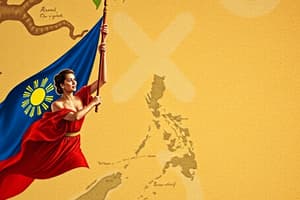Podcast
Questions and Answers
The Philippine Islands were discovered by ______ in 1521.
The Philippine Islands were discovered by ______ in 1521.
Magellen
Although the ______ rulers did not generally mix with the local populace, the Spanish language, religion and customs were imposed on the Filipinos.
Although the ______ rulers did not generally mix with the local populace, the Spanish language, religion and customs were imposed on the Filipinos.
Spanish
The earliest inhabitants of the Philippines were ______, sometimes called Pygmies.
The earliest inhabitants of the Philippines were ______, sometimes called Pygmies.
Negritos
By the 14th century many Filipinos in the southern areas had been converted to ______.
By the 14th century many Filipinos in the southern areas had been converted to ______.
The terms of the treaty of Paris in 1898 ceded the Islands to the ______.
The terms of the treaty of Paris in 1898 ceded the Islands to the ______.
In 1935, a ______ year transition period was established.
In 1935, a ______ year transition period was established.
On July 4, 1946, the Philippine Islands became the independent Republic of the ______.
On July 4, 1946, the Philippine Islands became the independent Republic of the ______.
Local histories may have sections or volumes of ______ information.
Local histories may have sections or volumes of ______ information.
In 1952, the Bureau of Public Schools began collecting and compiling local histories, legends, customs, traditions, and even ______ and poems.
In 1952, the Bureau of Public Schools began collecting and compiling local histories, legends, customs, traditions, and even ______ and poems.
The administration declared that its goal was the development of a free and ______ government.
The administration declared that its goal was the development of a free and ______ government.
Flashcards are hidden until you start studying
Study Notes
Discovery and Spanish Colonization
- The Philippine Islands were discovered by Magellan in 1521 and claimed by Spain.
- The first successful settlements were made in 1565.
Indigenous Peoples and Muslim Influence
- The original peoples were largely Malay and Indonesian tribes, Negritos.
- The earliest inhabitants were Negritos, sometimes called Pygmies.
- Muslim traders and teachers influenced the Philippines as early as the 11th century.
- By the 14th century, many Filipinos in the southern areas had been converted to Islam and were called Moros by the Spanish.
Spanish Rule
- The Spanish language, religion, and customs were imposed on the Filipinos.
- A strong centralized government with considerable clerical influence developed.
- Filipino groups maintained their identity and languages, but Spanish was introduced throughout the country.
19th Century Developments
- Trade restrictions were eased in the 19th century, creating a wave of prosperity.
- Chinese immigration increased dramatically during this period, as did Spanish emigration from newly independent countries of Latin America.
Filipino Desire for Independence
- Filipino desire for independence led to numerous uprisings, including one that began in 1896.
- The United States defeated Spain in 1898 in the Spanish-American War, and independence was declared, but the Philippines was ceded to the United States through the Treaty of Paris.
- The War of Resistance from 1899 to 1902 was fought against U.S. rule and is now referred to by many Filipinos as the Philippine-American War.
American Rule
- The U.S. declared that its administration was temporary and had as its goal the development of a free and democratic government.
- Public education, sound legal systems, and a bicameral legislature were implemented, and civil service was gradually taken over by Filipinos.
- The English language was used in official documents during this time period.
Path to Independence
- A ten-year transition period was established in 1935, but was interrupted by World War II.
- The Philippines was taken over by Japan from 1942 to 1944, causing great damage and loss of life.
- The country gained independence on July 4, 1946, becoming the Republic of the Philippines.
Local Histories and Family Research
- Local histories are valuable resources for family history research.
- Published histories of municipalities, cities, and provinces usually have accounts of families and early inhabitants.
- Local histories can provide background information about a family's lifestyle, community, and living environment.
Studying That Suits You
Use AI to generate personalized quizzes and flashcards to suit your learning preferences.




